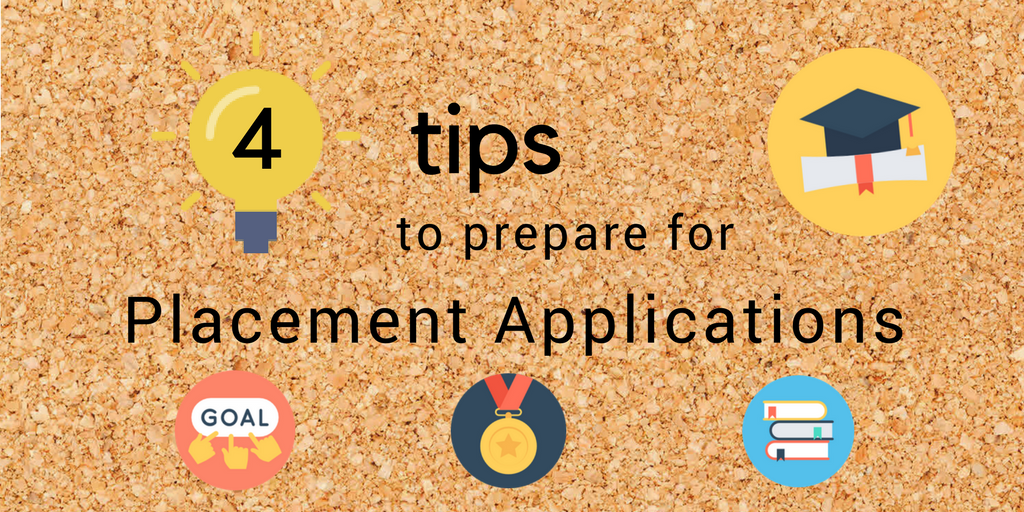By Jessica Marshall & Katie Wright on Thu 07 September 2017 in Placement Blog

It’s that time of year when you need to start thinking about applying for a placement...
Placement applications can be long and tedious, especially when you’re trying to balance University work too (trust us, we’ve been there!). Some Universities even make it compulsory that you complete a year in industry, making it even more pressured. But have no fear! The skills and knowledge you can gain on a placement make it all worthwhile.
To make the process a little easier, we’ve given you 4 tips that you can bear in mind when applying for any placement…
Tip #1: Prep – By failing to prepare, you’re preparing to fail
Preparation is SO important. Your CV and cover letter is the place to start with this. Be sure to personalise your CV and cover letter to tie in with the company and role. This will not only show them you’ve put in time and effort,but you’re probably going to be more successful in the recruitment process too. Make use of the support provided by your University for this, and get a few people to give it a proof read first.
It’s important to not forget your social media profiles too. You want to ensure you’re keeping these up to date (particularly your LinkedIn profile as it may be useful in your search). A good tip is to update your LinkedIn profile as and when you’re updating your CV so that they’re both singing from the same hymn sheet! Think of your LinkedIn account like a public virtual CV. LinkedIn can keep you up to date with relevant business news and reports, alongside connecting with contacts which could be beneficial in the future!
Tip #2: Do Your Research – Research the company you’re applying to
When you’re applying for a placement, you must, must, must research the company you’re applying to. There’s no denying that it’s going to involve some effort and time from you, but ultimately, it’ll pay off. Think about it – companies want to see your genuine interest in the company and the role you’re applying to, as they’ll likely have hundreds, or even thousands of applications coming in. You’ve got to stand out, and some thorough research goes a long way!
Use the company and placement website as a guide. You can also look into recent news articles about them, or read up on any new product releases to ensure you’re up to speed. The company may have been awarded an accolade that you could draw on – for example, ProspectSoft are an award-winning SME. This is something you could emphasise in your cover letter or even in your interview.
At the end of an interview, you’ll most likely to be asked if you have any questions for them. Never go into an interview without a set of prepared questions to ask (again, that are tailored to them!). This is a chance to further demonstrate your interest and find out a more about the company. Don’t forget it’s as important they sell the job to you as you sell yourself to them, so make the most of it!
Tip #3: First impressions count – Be yourself!
According to Business Insider, you only have 7 seconds to make a strong first impression. Not long, right? So it’s pretty important that you present yourself in the right way, straight away. In many cases, these first impressions or “gut feelings” can determine whether you get the job.
Whether it’s during a telephone interview or in person, you can put things in place to ensure you’re giving off the right impression to your interviewer. For example, if you’re having a telephone interview, you will need to prepare some potential answers, as well as some questions to ask the employer. You can practice in advance with a friend, lecturer or family member to ensure you sound confident on the phone, and it’s always a good idea to spend some time prior to the call getting all the information you need laid out in front of you.
If you’re invited to an interview in person or Assessment Centre, remember that body language can give a lot away. Make sure you perfect your handshake, and make eye contact with your interviewer. Avoid things like looking down, crossing your arms or slouching in your chair, as these all give off a bad first impression, and look unprofessional. All these small details can make a big difference when trying to secure a placement!
Tip #4: Experience – What transferable skills did you learn?
Seems like an odd thing to say when you’re applying for the experience…but likelihood is you’ve already got some. Even if you’ve only worked in a supermarket or in your local garden centre, you can still draw on some key skills. Plus, it’s good to balance your CV out with some academic evidence and work experience.
Experience on your CV allows you to stand out as an individual and can act as evidence for the skills you have listed as your strengths to the employer. It’s not just work experience you can think about here – add any volunteering or hobbies, and mention what transferable skills you’ve learnt from these experiences.
Employers want to gage a bit more about your personality and your interests to see if you would be well suited to the company. Someone with a positive attitude that spends their free time doing something productive is more likely to get through those initial interview stages. Those applicants will likely have more to talk about, and will have had the chance to develop more of their skills.
Getting involved in extracurricular activities reflects yourdetermination and a hardworking attitude, and will set you apart from your fellow students lounging around in bed! Working in different professional environments will allow you to better understand your own strengths and weaknesses, and will help you discover your future career path.